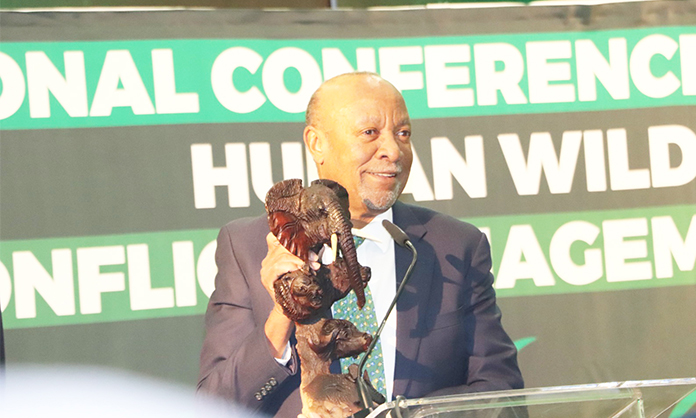Vice president Nangolo Mbumba has called for the review of policies on human-wildlife conflict.
Mbumba yesterday at the official opening of the national conference on human-wildlife conflict management in Windhoek, said the issue should not be the government’s responsibility alone.
“It should be the responsibility of all citizens and state agencies to minimise losses and the impact of wild animals.
“We need to manage human-wildlife conflict in a way that recognises the rights and development needs of local communities, and the need to promote biodiversity” he said.
Mbumba said conservancies have to date benefited about 245 000 Namibians in various regions with conservancies.
He said residents have benefited through employment creation, cash receipts, social projects, and in-kind benefits.
He said the government views national parks as the cornerstone of conservation programmes which play an important role in the conservation of ecosystems and biological diversity.
“Our national parks are some of Namibia’s most valuable assets, and their tourism potential should be harnessed to the benefit of all our people.
“The government has also encouraged the management of wildlife for commercial use on freehold farms in terms of existing legislation,” he said.
Mbumba said such management contributes to the conservation of wildlife species and to habitat protection for the maintenance of biodiversity.
The vice president said despite all these successes, the government recognises that living with wildlife often carries a cost, and that the increased wildlife populations in communal and freehold farming areas result in more frequent conflict between people and wild animals.
“To this end, the government has developed a national policy on human-wildlife conflict management that provides mechanisms to manage human-wildlife conflict and benefit communities from wildlife and other natural resources,” he said.
Mbumba said he was informed that the Ministry of Environment, Forestry and Tourism continues to receive several requests from the public, asking for compensation for damage caused by wildlife.
He said this indicates that there is a serious need to reduce the growing tension around human-wildlife conflict, as the loss of human lives, livestock, and crops and damage to infrastructure affects livelihoods.
“This conference should investigate and establish mechanisms that would provide compensation to affected parties whose family members die or are severely injured as a result of human-wildlife conflict.
“We would therefore call upon our international friends who so dearly love wildlife to come on board and help us with financial, technical and managerial means,” Mbumba said.
He said this is not only to the country’s benefit, but to that of humanity.
Mbumba said biodiversity is beneficial to our survival, as well as to the sustainable conservation of the environment.
Present at the national conference was environment minister Pohamba Shifeta, who said he believes more has been achieved through the implementation of human-wildlife conflict management.
“In putting mitigation and preventative measures to manage human-wildlife conflict, we also recognise that a lot still has to be done,” he said.
Shifeta applauded all stakeholders involved in biodiversity conservation, the improvement of livelihoods in communities and farmers through the use of wildlife resources and in human-wildlife conflict management measures.
Stay informed with The Namibian – your source for credible journalism. Get in-depth reporting and opinions for
only N$85 a month. Invest in journalism, invest in democracy –
Subscribe Now!






